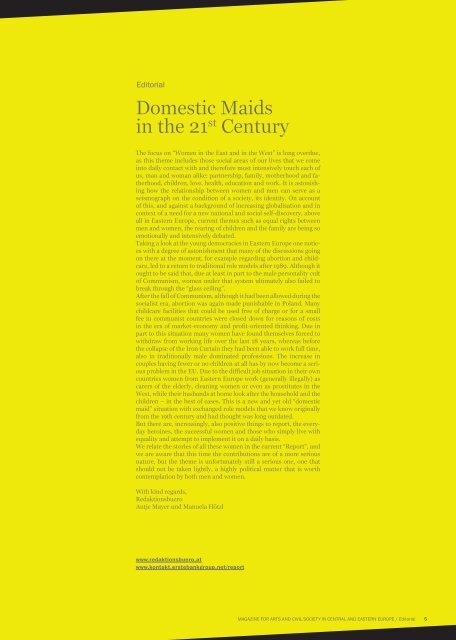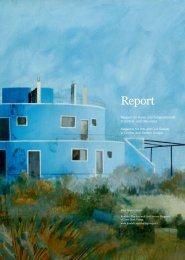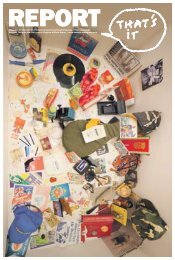Create successful ePaper yourself
Turn your PDF publications into a flip-book with our unique Google optimized e-Paper software.
Editorial<br />
Domestic Maids<br />
in the 21 st Century<br />
The focus on “Women in the East and in the West” is long overdue,<br />
as this theme includes those social areas of our lives that we come<br />
into daily contact with and therefore most intensively touch each of<br />
us, man and woman alike: partnership, family, motherhood and fatherhood,<br />
children, love, health, education and work. It is astonishing<br />
how the relationship between women and men can serve as a<br />
seismograph on the condition of a society, its identity. On account<br />
of this, and against a background of increasing globalisation and in<br />
context of a need for a new national and social self-discovery, above<br />
all in Eastern Europe, current themes such as equal rights between<br />
men and women, the rearing of children and the family are being so<br />
emotionally and intensively debated.<br />
Taking a look at the young democracies in Eastern Europe one notices<br />
with a degree of astonishment that many of the discussions going<br />
on there at the moment, for example regarding abortion and childcare,<br />
led to a return to traditional role models after 1989. Although it<br />
ought to be said that, due at least in part to the male personality cult<br />
of Communism, women under that system ultimately also failed to<br />
break through the “glass ceiling”.<br />
After the fall of Communism, although it had been allowed during the<br />
socialist era, abortion was again made punishable in Poland. Many<br />
childcare facilities that could be used free of charge or for a small<br />
fee in communist countries were closed down for reasons of costs<br />
in the era of market-economy and profit-oriented thinking. Due in<br />
part to this situation many women have found themselves forced to<br />
withdraw from working life over the last 18 years, whereas before<br />
the collapse of the Iron Curtain they had been able to work full time,<br />
also in traditionally male dominated professions. The increase in<br />
couples having fewer or no children at all has by now become a serious<br />
problem in the EU. Due to the difficult job situation in their own<br />
countries women from Eastern Europe work (generally illegally) as<br />
carers of the elderly, cleaning women or even as prostitutes in the<br />
West, while their husbands at home look after the household and the<br />
children – in the best of cases. This is a new and yet old “domestic<br />
maid” situation with exchanged role models that we know originally<br />
from the 19th century and had thought was long outdated.<br />
But there are, increasingly, also positive things to report, the everyday<br />
heroines, the successful women and those who simply live with<br />
equality and attempt to implement it on a daily basis.<br />
We relate the stories of all these women in the current “Report”, and<br />
we are aware that this time the contributions are of a more serious<br />
nature, but the theme is unfortunately still a serious one, one that<br />
should not be taken lightly, a highly political matter that is worth<br />
contemplation by both men and women.<br />
With kind regards,<br />
Redaktionsbuero<br />
Antje Mayer und Manuela Hötzl<br />
www.redaktionsbuero.at<br />
www.kontakt.erstebankgroup.net/report<br />
MAGAZINE FOR ARTS AND CIVIL SOCIETY IN CENTRAL AND EASTERN EUROPE / Editorial<br />
5




